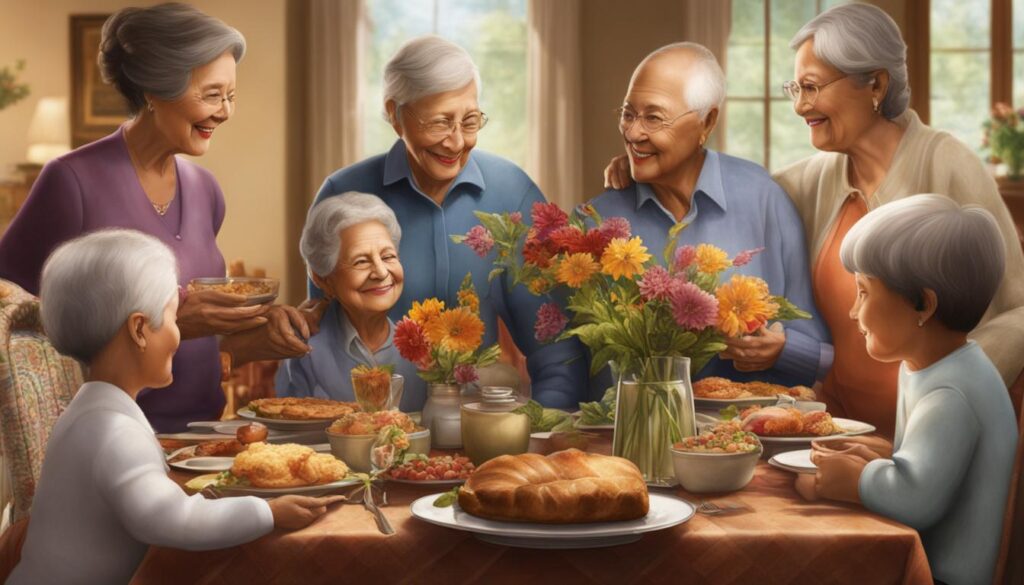Family dynamics play a crucial role in shaping our lives, even in our 70s. As we age, our relationships with family members become even more important, providing us with support, love, and understanding. In this article, we will explore the significance of family gatherings, effective communication, and the power of sharing legacy stories in fostering strong family relationships in your 70s.
Key Takeaways:
- Family dynamics continue to influence well-being in later adulthood.
- Effective communication is essential for maintaining strong family bonds.
- Participating in family gatherings promotes mutual respect and understanding.
- Sharing legacy stories creates a sense of belonging and strengthens family ties.
- Nurturing positive family relationships contributes to overall well-being and legacy.
The Impact of Marital Relationships on Well-being in Later Adulthood
Marital relationships have a profound impact on the well-being of individuals in later adulthood. Research suggests that being happily married is associated with better mental and physical health, comparable to risk factors like smoking and obesity. A satisfying marital relationship provides emotional support, companionship, and a sense of belonging, which contribute to overall well-being.
However, not all marital relationships have positive effects on well-being. Marital strain and dissatisfaction can have detrimental effects on an individual’s mental and physical health. It is important to address and resolve conflicts within the relationship to promote a healthier and happier life in later adulthood.
“A happy and fulfilling marriage can be a protective factor for overall well-being in older adults.”
Marital transitions, such as divorce, widowhood, and remarriage, also influence well-being in later adulthood. These transitions can bring both challenges and opportunities to individuals’ lives, affecting their mental health and overall satisfaction. It is crucial to recognize the differences in the experiences of men and women during marital transitions, as they may have unique vulnerabilities and benefits.
The Impact of Marital Relationships on Gender Differences
Studies have shown that men tend to benefit more from marriage in terms of physical health, while women tend to benefit more in terms of emotional well-being. Understanding these gender differences can help tailor interventions and support systems to address the specific needs of individuals in different marital circumstances.

By recognizing the impact of marital relationships on well-being in later adulthood and by understanding the gender differences in these relationships, individuals can take proactive steps to promote healthier and more fulfilling marital relationships. Through open communication, support, and mutual respect, couples can navigate the challenges and transitions of later life together, enhancing both their well-being and the quality of their relationship.
Aging Families: Navigating Complexity and Diversity
Aging families are characterized by a multitude of complex and diverse relationships that shape their emotional bonds, structure, and overall functioning. Understanding the dynamics of intergenerational relations, caregiving, siblings, marriage, and widowhood is crucial for comprehending the intricacies of aging family dynamics.
One significant aspect of aging families is the intergenerational relationships between parents and their adult children. The intergenerational solidarity paradigm provides a framework for understanding the sentiments, behaviors, and structural arrangements within these relationships. However, it is essential to recognize that ambivalence can also exist, whereby family members may simultaneously hold warm and antagonistic feelings toward each other.
Caregiving and sibling relationships also play vital roles in the aging family dynamic. As individuals age, the need for support and assistance may arise, leading to changes in familial roles and responsibilities. Siblings often collaborate in providing care for aging parents, and the dynamics of these relationships can vary greatly. Additionally, aging families may experience changes in structure and households due to factors such as divorce, remarriage, and stepfamily formation.
Embracing the complexity and diversity of aging family relationships presents both challenges and opportunities for research and support. By gaining a deeper understanding of these dynamics and promoting open lines of communication, we can navigate these intricacies and foster stronger, more resilient family bonds.

Table
| Relationship | Key Dynamics |
|---|---|
| Siblings | Collaboration in caregiving, varying levels of closeness and support |
| Marriage | Impact of marital transitions (divorce, widowhood, remarriage) on family dynamics |
| Intergenerational Relations | Interplay between support and ambivalence within parent-adult child relationships |
| Widowhood | Adjustments and challenges faced by individuals after the loss of a spouse |
| Caregiving | Roles, responsibilities, and strain associated with providing care for aging family members |
Social Development and Healthy Aging
Social relationships are a vital aspect of healthy aging. While it is common for social networks to shrink in size as we age, research has shown that the quality of these networks remains stable or even improves. Older adults report greater relationship satisfaction, more positive emotions, and increased perceived support from their close partners.
Emotionally fulfilling relationships and the social and emotional support they provide play a crucial role in buffering older adults against the challenges that come with aging. It is important to prioritize positive social relationships and invest in meaningful connections to enhance overall well-being.
However, it is essential to acknowledge that interpersonal tensions and feelings of loneliness can have negative consequences for mental health and well-being. While these challenges are not necessarily more prevalent in later adulthood, they require attention and proactive efforts to address. By fostering positive social relationships and creating opportunities for social engagement, older adults can mitigate these risks and improve their emotional well-being.
Research has consistently shown that maintaining strong social ties is associated with a variety of health benefits, including reduced rates of depression and anxiety, better cognitive function, and even enhanced longevity. Therefore, it is crucial for older adults to actively nurture their social networks, engage in social activities, and seek out opportunities for connection and support.

The Importance of Positive Social Relationships
Positive social relationships have been linked to numerous benefits for older adults. They provide emotional support, companionship, and a sense of belonging, which can help combat feelings of loneliness and social isolation. Additionally, engaging in meaningful social interactions can stimulate cognitive function and promote a sense of purpose and fulfillment.
Research has also shown that social relationships have a substantial impact on physical health outcomes. Strong social connections have been associated with lower rates of chronic diseases such as cardiovascular disease, hypertension, and even certain cancers. Additionally, individuals with robust social networks tend to have better immune function and a higher overall quality of life.
In summary, fostering positive social relationships is crucial for healthy aging. By prioritizing meaningful connections and actively participating in social activities, older adults can enhance their emotional well-being, reduce feelings of loneliness, and improve their overall health. Investing in social relationships is an investment in a happier, healthier, and more fulfilling life as we age.
Conclusion
Fostering strong family relationships in your 70s is crucial for promoting well-being, mutual support, and creating a sense of belonging. As you navigate the intricacies of family dynamics, several key relationships play important roles in strengthening family bonds.
Marital relationships, the cornerstone of family life, have a significant impact on well-being in later adulthood. By prioritizing open communication, mutual respect, and love, you can nurture a healthy and fulfilling marriage that positively influences your overall well-being.
Intergenerational relationships, particularly between parents and adult children, are another vital component of the family dynamic. Understanding the complexities of these relationships, embracing diversity, and maintaining strong connections can foster a sense of unity and support within the family.
Additionally, sibling relationships and the bonds you share with your brothers and sisters contribute to the strength of the family unit. Investing in meaningful connections with your siblings through shared experiences, communication, and support can help create a lasting legacy of love and understanding.
By prioritizing positive social relationships and nurturing the connections that matter most to you, older adults can navigate the challenges and joys of family life. Through embracing diversity, maintaining open lines of communication, and investing in meaningful relationships, you can build and maintain robust family bonds that endure through the years, leaving a lasting legacy of love, support, and understanding.
FAQ
How can I foster strong family relationships in my 70s?
Fostering strong family relationships in your 70s is crucial for promoting well-being, mutual support, and creating a sense of belonging. It involves open communication, regular family gatherings, and sharing personal legacy stories.
What is the impact of marital relationships on well-being in later adulthood?
Marital relationships have a significant impact on well-being in later adulthood. Being happily married is associated with better mental and physical health. However, marital strain and dissatisfaction can have negative effects. Marital transitions, such as divorce, widowhood, and remarriage, also shape life context and influence well-being. Additionally, there may be gender differences in the impact of marital relationships on well-being.
What are the complexities and diversity in aging family relationships?
Aging families exhibit complexity and diversity in their emotional relations, structure, and functioning. The intergenerational solidarity paradigm provides a framework for understanding sentiments, behaviors, and structural arrangements in parent-adult child relationships. However, the concept of ambivalence recognizes that family members may simultaneously hold warm and antagonistic feelings toward each other. Aging families also experience changes in structure and households due to factors like divorce, remarriage, and stepfamily formation. The roles of caregiving and sibling relationships are also significant in the aging family dynamic.
How does social development impact healthy aging?
Social relationships are crucial for healthy aging. While social networks may shrink in size with age, the quality of social networks remains stable or even increases. Older adults report more positive emotions, greater relationship satisfaction, and more perceived support from close partners. Interpersonal tensions and loneliness can have negative consequences for mental health and well-being. Emotionally gratifying relationships and the social and emotional support they provide help buffer older adults against the challenges of aging. Promoting positive social relationships can enhance healthy aging outcomes.
Why is fostering strong family relationships in your 70s important?
Fostering strong family relationships in your 70s is crucial for promoting well-being, mutual support, and creating a sense of belonging. Marital relationships, intergenerational relationships, and sibling relationships all play important roles in the family dynamic. Understanding the complexities of family relationships, embracing diversity, and maintaining open lines of communication are key to building and maintaining robust family bonds. By prioritizing positive social relationships and investing in meaningful connections, older adults can navigate the intricacies of family dynamics, strengthening family ties and leaving a lasting legacy of love, support, and understanding.
How Can Philanthropy and Charitable Giving Help Strengthen Family Relationships in Your 70s?
Embracing philanthropy and charitable giving in your 70s can have a profound impact on family relationships. By working together to contribute and support causes that align with their values, family members can foster a sense of unity and purpose. Engaging in philanthropy can deepen connections, spark meaningful conversations, and create shared memories, further strengthening the bond between generations. Moreover, being actively involved in giving back can instill values of compassion and empathy, leaving a lasting legacy for future generations to carry forward.


Pingback: Aging in Community: Building Support Networks in Your 70s – Straight Fire Money